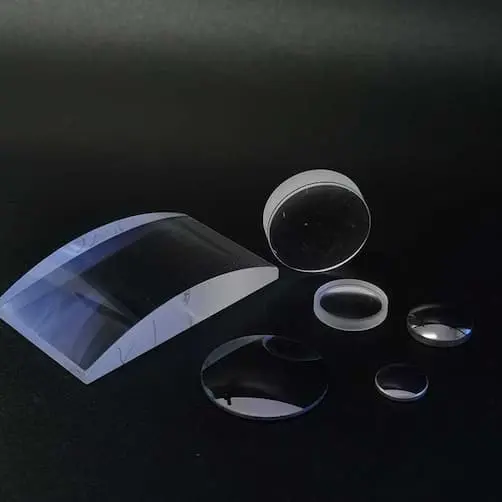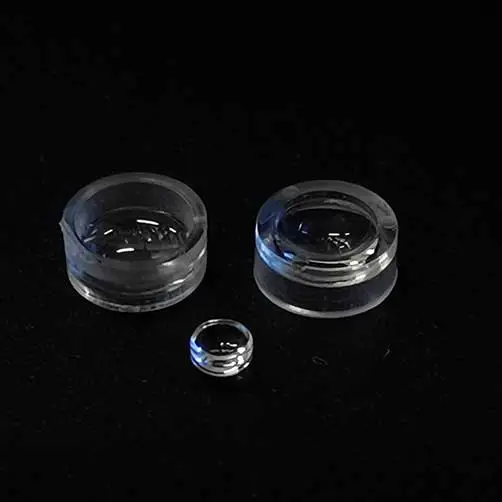Pentaprism is one of the constant angle 90-degree beams.
a. Camera System
b. Testing System
c. High Angle Tolerance
d. Large Dimension
Material | BK7 Grade A Optical Glass |
Dimension (h) Tolerance | ±0.1 mm |
Dimension (A) Tolerance | ±0.2 mm |
Clear Aperture | >80% |
Surface Quality | 60-40 Scratch And Dig |
90° Deviation Tolerance: | < 30 Arcsec |
Flatness: | λ/2 at 632.8 nm (Standard), up to λ/4 @632.8 nm |
Reflectivity | R>95% Per Face @630-680 nm |
Protective Bevel | 0.25 mm x 45° |
Material | Optical Glass, Fused Silica, Sapphire. |
Dimension | 1-250 mm |
Dimension Tolerance | +0/-0.1 mm |
Surface Flatness | λ/10@632.8 nm |
Surface Quality | 10-5 |
Angular Accuracy | 5 Second |
Coating | Uncoated, AR, HR, Beamsplitter, etc. |
A x h (mm) | 1 min. Deviation | 30 sec. Deviation | 10 sec. Deviation | 5sec. Deviation |
Part No. | Part No. | Part No. | Part No. | |
7 x 6 | TPP101 | TPP201 | TPP301 | TPP401 |
8 x 8 | TPP102 | TPP202 | TPP302 | TPP402 |
10 x 10 | TPP103 | TPP203 | TPP303 | TPP403 |
The penta prism is an essential component in the optical viewfinder of a camera, and it serves to correct the reversed and laterally inverted image projected by the camera lens. The pentaprism, which is often made of high-quality glass, is placed inside the camera body to direct the light from the lens upwards towards the viewfinder.
As the light passes through the pentaprism, it undergoes several reflections, which corrects the orientation of the image and ensures it appears right-side-up and non-reversed. This correction is essential for photographers to correctly frame and focus their shots.
The pentaprism also helps to increase the viewfinder's brightness by redirecting a portion of the light back into the lens, thereby improving the viewfinder's overall image quality.
Overall, in a camera, the pentaprism function is to correct the image orientation, providing a clear, bright and accurately framed view for the photographer to take the shot. The pentaprism is a vital component that ensures that the photographer captures the intended image correctly.
Looking for the optical prism types? Look no further than TC Optics' high-quality penta prism. With unbeatable support and competitive prices, our prisms are perfect for a range of optical applications. Order now and experience the difference with TC Optics, a professional optics manufacturing company.
Penta prisms and roof prisms are both optical devices commonly used in optical instruments, such as cameras and binoculars, to correct and invert the light path. The following are the differences between the two:
Prism Shape: Penta prisms are five-sided prisms that use total internal reflection to reflect light, while roof prisms are specially shaped prisms that use reflections and a phase shift to reflect the light.
Light Transmission: Penta prisms transmit about 90% of the incident light, while roof prisms transmit about 80%. The difference in light transmission affects the brightness and clarity of the image observed through the optical device.
Application: Penta prisms are commonly used in photographic cameras, while roof prism designs are frequently used in binoculars and other optical instruments.
Cost: Penta prisms tend to be more expensive than roof prisms due to their higher light transmission capabilities and more complex construction.
Overall, while penta prisms and roof prisms have different applications and shapes, both are effective tools that serve similar purposes of correcting the light path in optical devices.
If you would like to build your own precision optical products or request a quote, please click one of the two buttons below. Otherwise, please fill out the form below with any questions or concerns.

Address
No. 946,Chaoyue street,High-tech zone,Changchun city,Jilin
Call Us
+86-431-84563660


